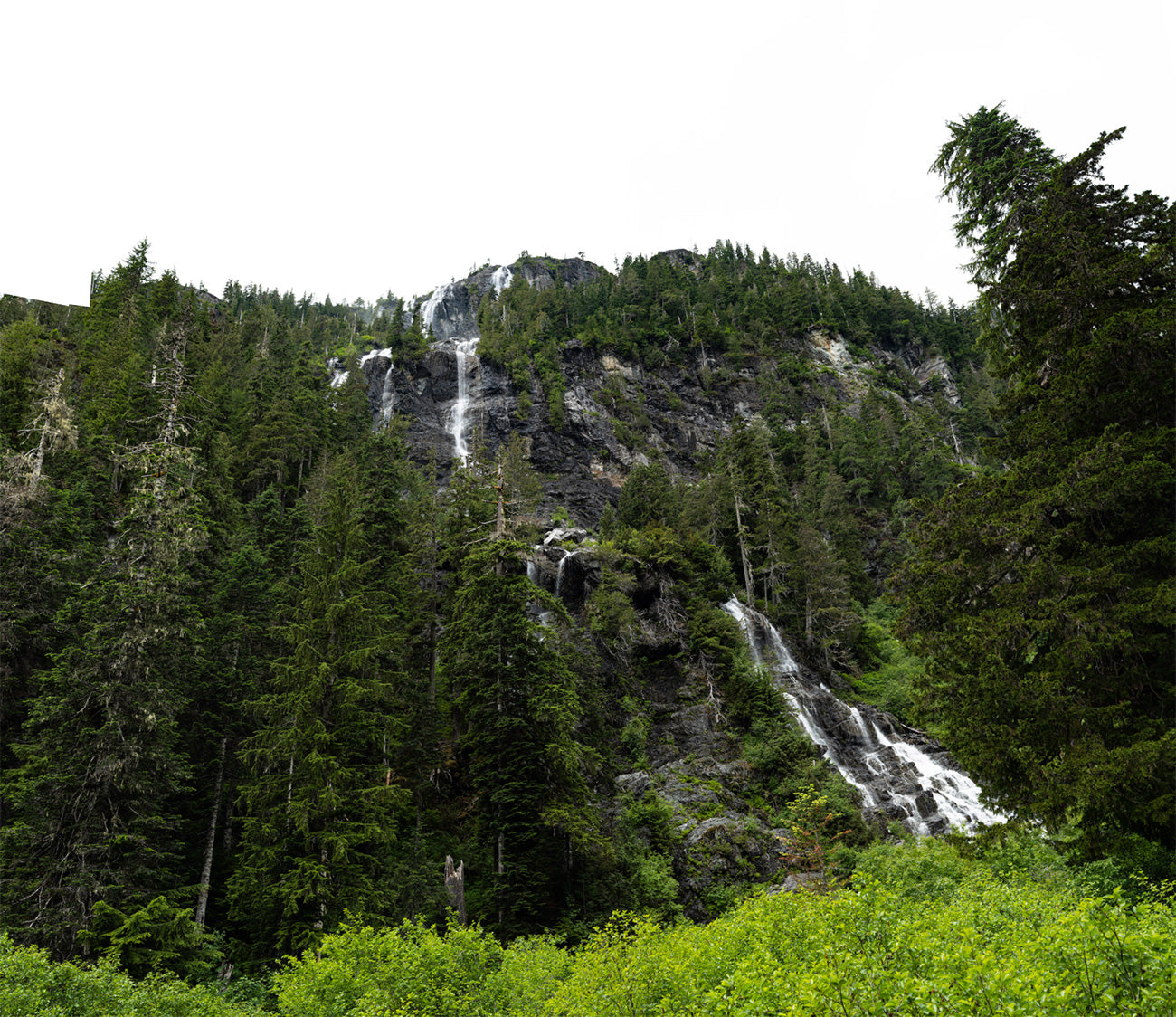
Exploring Canada's Highest Waterfalls By Canoe
Eagles flying through sun-blasted, golden light and raindrops, sore toes dangling in icy crystal waters… and rainbows.

In early June, Ben and I spontaneously decided to hike into Canada’s highest waterfall, Della Falls, located in Strathcona Park on Vancouver Island. We weren’t sure if the snow line would let us explore much, so our fingers were crossed. The plan was to drive down logging roads and get as close as possible to the end of Great Central Lake.
From there, it would be a Mission Impossible-style bushwhack to the trailhead at the far end of the lake. The accuracy of our estimates put the bushwhack distance somewhere between 1-5km through rough terrain. It was a flagging tape and compass type of idea.
I should note at this point that you can pay a boat around $135 each for a ride to the end of the lake. But where’s the fun in that?
Then at the 11th hour, Ben called me.
“Hey man…” — (uh-oh) “… so I was thinking…” — (here comes the drop) “... how about we canoe instead?”
Ben is a canoe guide. Ben’s dad is an epic French Canadian — iconic personality and adventurer. Ben’s plan also made way more sense. It was a guaranteed route to the trailhead instead of a cliff and devils club strewn bushwhack, but it was a long time in a canoe on a lake famous for its winds — and a forecast calling for two days of rain.
I tried a last-minute save, “Will you be able to load the canoe onto the car by yourself?”
“Oh yeah, totally!”
Right.

Ben arrived in the early hours with a beautiful blue canoe on the roof of his car. We caught the ferry off Salt Spring Island, drove up to Port Alberni, and straight to the access point on Great Central Lake. We were worried about wind and timing was imperative — it was 11 a.m. and any bit of heat would turn the thermal winds on.
Aiming to cut corners and travel the shortest distance as the crow flies, we paddled hard, westwardly into Strathcona Park. And I won’t say where, out of respect for locals, but we found three beautiful lunch/camp spots on Great Central Lake and chose the last one, four or five hours later, as our put in for the night.

A rainbow rose as the wind blew the rain sideways through glorious sunshine. We pitched the tent on a rocky outcrop with views towards the end of the lake and tied it down. But the snow-capped mountains and valley we’d hike up the next day were still wrapped in a cowl of wind-driven rain and mystique.


Both Ben and I are professional guides to some degree, Ben is the owner of a canoe and hiking expedition guiding company called Gaia Wild Adventures and I’ve been occasionally sighted in kayaks or out on the trails with clients. So, for both of us, this trip was a happy little departure from nature-experiences-as-work and a good chance to scout new terrain, not worry about the other person, and pack as light as possible.
Which meant it was a good chance to introduce Ben to my favorite lightweight, gluten-free hiking food mix (shoutout to Jill Carlile, who’s training to be a doctor, in Alaska):
- In one large Ziploc bag mix: dehydrated potatoes, spice mix, pre-cooked bacon, sun-dried tomatoes, 10-sheets of nori seaweed and most importantly an entire bag of Fritos corn chips
It’s great because you don’t need a stove to re-hydrate it, which is what I did. Ben made the right decision and brought a stove.
The next morning we sampled another new concoction:
- Quinoa flakes, powdered coconut milk (#calories), hemp seeds, dried fruit, chocolate chips, and spice to taste
Luckily, Ben shared his stove…

We quickly packed up and continued our paddle to the trailhead. The water of Great Central Lake is incredibly clear (it’s 333 meters deep) so one of the best parts of the trip was paddling along the shoreline, looking down on old pilings from past logging sites and communities, bulldozer tracks and rusting cable, or weaving the canoe through all the dead standing trees that were left stranded when the lake was dammed and its level raised.

An hour or so later we pulled the canoe up the boat dock, hid it in the woods, and started up the trail followed by a fierce posse of mosquitos and a rain squall. Walking through lush overhanging underbrush it would be an understatement to say we got wet.
The early season trail is a lush, flower-filled affair — punctuated by tiger lilies, red columbines, albino banana slugs, and a trove of other temperate beauties. Following an abandoned railway grade, it’s a pleasant walk with several bridges crossing over glacial streams and boulder-strewn swimming holes. After taking the cable car across Drinkwater Creek, the first place you can see Della Falls from, the elevation change increases and you meander through a forest of immense old-growth hemlock trees towards the upper campsites and the base of the falls.

We chose to head straight to the falls. They are super tall. However, I think we were a bit too wet and cold to appreciate them. We gave them a five-minute gaze and then got right to work in building a fire in a designated pit. If we didn’t get dry, the next two days were going to be miserable.


The next day we hiked back down, with a quick foray up towards Love Lake (hoping for a better view). The snow line was low, the weather was packed in, and the potential for a view was negligible so we gave up. On a clear day, you can see all the mountains towering over the valley.

Early into the afternoon saw us back at the lake and for the first time the whole trip, it was sunny without also raining at the same time! We took a swim and then warmed up.

To make up for the failed attempts up the valley, we turned to the canoe as our source of exploration and aimed it still further down the lake to peruse the standing old-growth and the intriguing river valleys across from us. We paddled up a crystalline creek through old-growth forest, old man's beard lichen hung from branches waving in the breeze. We floated back down in silence; our sore feet dangled out of the canoe and trailing through the icy water. Rain fell lightly in silence. As the low-angled sun blasted through spattered rain-filled air, a bald eagle wheeled through the golden light riding the turbulent air mass.

Nature therapy complete, we checked out another incredible local spot that I’ve been sworn to tell you, literally, zero things about.

At sunset, we found ourselves halfway back down the lake and crossed back to the north side, with high hopes for a campsite. We’d already traveled 18km on foot and at least that again by canoe — it was time for snacks.
In a daze, we watched the sunset, pitched our Hornet™ 2P tent under the watchful eye of an eagle's nest, and got some shut-eye.

The next morning saw us paddling in the sun, for the first time, and naturally, against the wind. We explored the available creeks, watched a black bear cub scramble up a slippery arbutus strewn slope, practiced our siestas, and eventually made it back to the launch site for a quiet drive home.
Essential Gear:
- Hornet™ 2P: an awesome, lightweight shelter that kept us dry despite all the rain — and offered plenty of room for us and our gear.
- Tensor™ Insulated Regular: a pad is so lightweight, quiet, and comfortable ... and plenty warm when the nightly temps dropped.
-
Kayu™ 15° Regular: this athletic mummy bag took up very little pack space and kept me plenty warm.
Keegan Pearson is a commercial and editorial photographer, as well as a part-time backpacking guide out of the temperate coastal region of Western Canada, with a healthy love of outdoor adventure.
